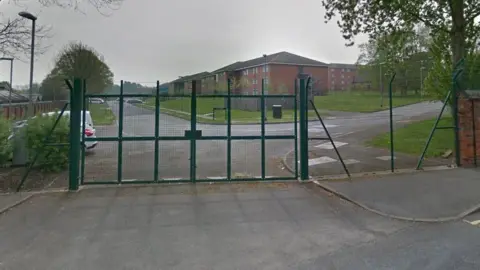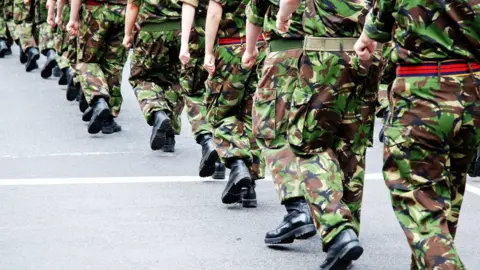Staffordshire Army deaths: Urgent action over sickle cell
 Google Maps
Google MapsThe deaths of two Army recruits during military training could be repeated without urgent government intervention, a coroner has warned.
Kamil Iddrisu, 25, and Youngson Nkhoma, 31 died within days of each other in November during officer selection.
The soldiers were taken ill with undiagnosed sickle cell disorders at Whittington Barracks, Staffordshire.
The Ministry of Defence (MoD) said it had taken immediate steps "to understand what has happened."
In a report sent to the MoD, Birmingham and Solihull's senior coroner Louise Hunt urged further action for candidates at risk of sickle cell trait (SCT).
An inquest heard that Mr Iddrisu and Mr Nkhoma, sent from Ghana and Malawi to the UK for officer selection, collapsed whilst taking part in separate training runs.
Mr Iddrisu died on 17 November and Mr Nkhoma on 27 November, after being taken to Good Hope Hospital in Birmingham with severe kidney damage.
A pathologist concluded that the most likely cause of each man's collapse was SCT in combination with military exercise, said the coroner's report.
 Getty Images
Getty ImagesMs Hunt called on the MoD to consider screening all non-UK selection candidates with a blood test.
"I have been advised that three other men have also collapsed in similar circumstances, requiring intensive treatment, however they did not die," she said.
"I am concerned that there is a group of non-UK candidates who are at risk of death or harm if further steps are not taken immediately," Ms Hunt added.
The coroner gave the MoD until January 31 to respond.
An army spokesman confirmed the deaths but said it could not comment further.
The MoD said a service inquiry had been convened to look at the circumstances surrounding the two deaths and put mitigations in place.
It added that future candidates would be screened for SCT via an NHS questionnaire and work was underway to introduce blood tests.
Sickle cell disease affects about 15,000 people in the UK.

Follow BBC West Midlands on Facebook, on Twitter, and sign up for local news updates direct to your phone.
